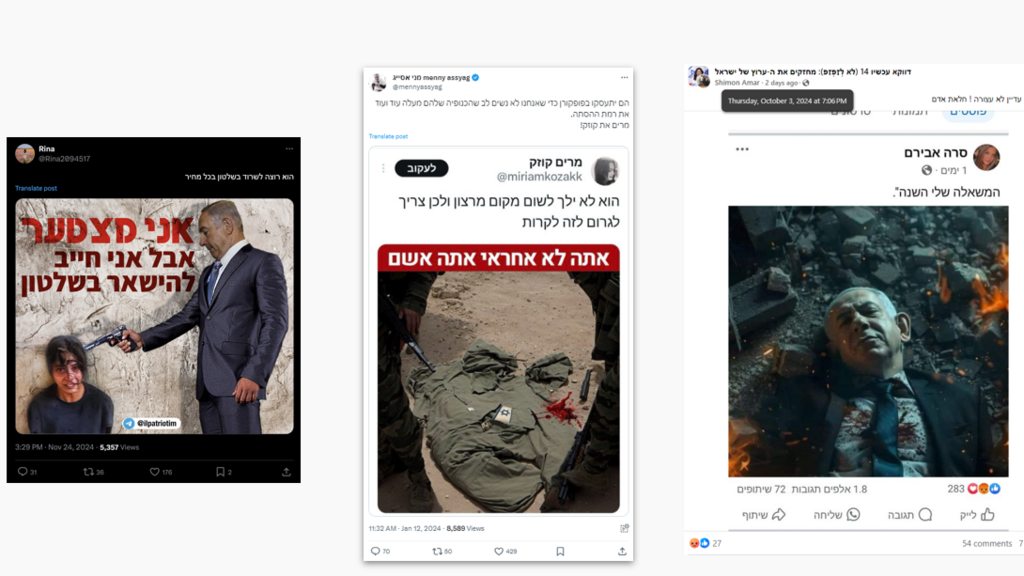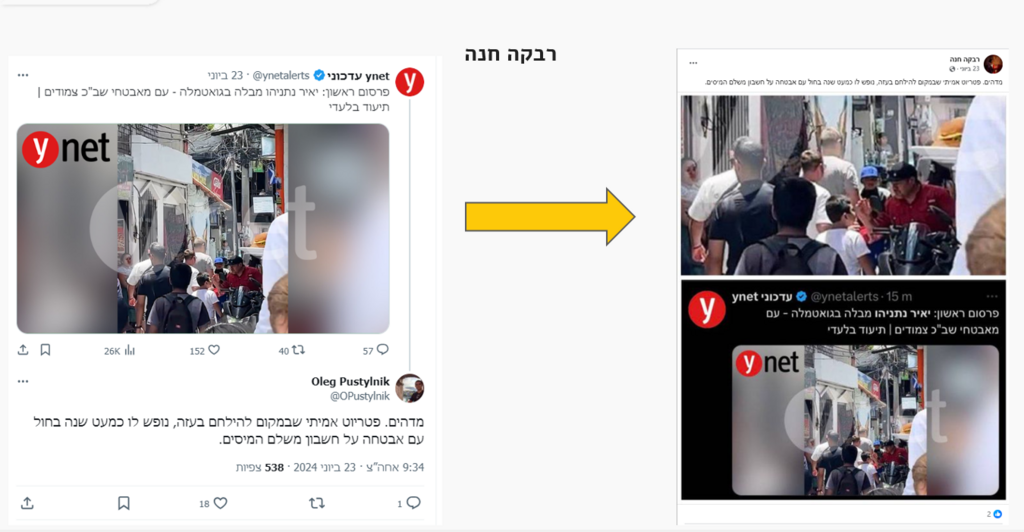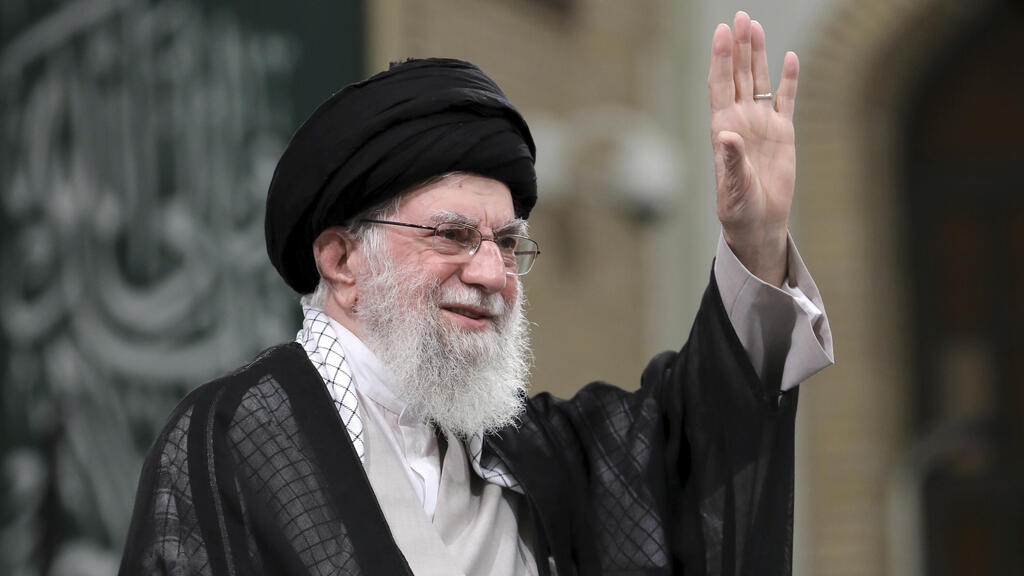Getting your Trinity Audio player ready...
They seem like regular Israelis. Their profiles on Meta platforms or X are rich with content history and their Hebrew is flawless. In recent months, a new foreign influence network – likely Iranian in origin – has begun operating on social media aiming to incite division and demoralization in Israel, spread hatred toward ultra-Orthodox Jews, encourage violent protests and even promote refusal to serve in the IDF. This involves dozens of bots working in unison, making them harder than ever to identify.
The "FakeReporter" organization, which investigated the network's activity, found that one of the main factors enabling these fake profiles to blend in with Israelis is the use of artificial intelligence (AI).
Using various AI tools, these bots communicate in perfect Hebrew, their profile pictures are modified to obscure their stolen origins and their operators easily create graphics that amplify the impact of the posts the bots promote.
The goal: Dividing Israeli society
The primary function of these profiles is to disseminate inciteful videos made by Hamas and Hezbollah, particularly during dramatic events such as attacks from Iran or after the dismissal of former defense minister Yoav Gallant.
The content focuses on calls to end the war in Gaza, escalate protests to the point of violence, amplify public outrage over the hostage situation and heighten anger over ultra-Orthodox draft evasion.
You may have encountered "Avraham Moshe" online – a profile with 2,400 followers and a profile picture of Swedish singer Maher Zain. This account is characterized by elaborate impersonation, fluent Hebrew and rich graphics.
Or "Keren Ovadya," with 3,800 followers, whose profile features an image of a beating heart with Israel at its center and who intensively posts anti-Netanyahu content.
The profile "Maya Li" changed its name to "Maya Lipschitz" after connections to fake accounts were exposed. The profile picture actually belongs to a Canadian high school student, though the posts claim the user spends significant time in Tel Aviv and occasionally confuses masculine and feminine terms.
The profile picture of "Liyal Tal" is a sophisticated AI creation, altering facial features to make the original source untraceable.
One of the most dangerous fake profiles uncovered operates under the name "Rebecca Elia." This account frequently changes its pictures and encourages users to join a Telegram group called "Patriotic Israelis."
The group was created by a fake profile and disseminates Iranian propaganda and other inciteful content, alongside posts and comments from genuine, unsuspecting Israeli citizens. These are only a few examples.
‘The network reached hundreds of thousands of Israelis’
FakeReporter’s head Achiya Schatz explained in an interview with Ynet that: "This network has managed to reach hundreds of thousands of Israelis. It has a significant following and exposure, and some of its posts have stirred public discourse and significantly influenced conversations."
"In one instance, a post by a fake user named 'Sara Aviram' gained massive reach after being shared by Israeli rapper and influencer 'The Shadow.' In another, an image of Netanyahu seemingly after an assassination attempt triggered reactions from right-wing influencers like Ben Assayag, making it spread further.
Another example was a fake profile named 'Miriam Kozak,' which posted an AI-generated image of Netanyahu supposedly shooting a hostage. This, too, achieved wide spread reach and caused a stir online. Schatz added that the operators succeeded in their goal in all these cases: polarizing Israelis and intensifying internal hatred.
Modus operandi: Infiltrating online groups
According to the report, the network consists of about 60 profiles, mostly active on Facebook, which have produced over 18,000 social media posts so far. Most activity is concentrated within anti-government protest networks and campaigns for the return of Israeli hostages.
Data revealed that the fake profiles' operators reached 979,000 Israelis in 89 anti-government protest groups. In 11 pro-Netanyahu groups, they reached another 121,000 Israelis. The result is grim: many of the fake messages disseminated by the network are warmly received by Israelis, shared, commented on and spark public uproar.
In some cases, the fake profiles copy images and content from Israelis to amplify them. In others, they inject Iranian, Hamas and Hezbollah propaganda videos directly into Israeli discourse.
On another front, fake profiles infiltrated 1,239 different Facebook groups for Israelis discussing various non-political topics, spanning languages like Hebrew, English, Spanish, Russian and even Amharic.
FakeReporter identified a particular effort to infiltrate groups of Israelis abroad – 52 groups with over 1.2 million users. Schatz speculated that this might aim to gather information about these Israelis’ activities and behaviors, potentially for planning terror attacks.
"People lower their defenses in such groups, feeling they’re in a private setting, making it easier to form connections and gather information," he explained.
The fake personas created by this network have reached a masterful level. AI-generated alterations to photos make it nearly impossible to trace their origins. The operators use Israeli names for their bots, alter dates to fabricate history for their fake profiles and post content on varied topics like food or art to craft an authentic image.
Schatz warned that the use of AI makes foreign influence much more dangerous: "AI has elevated foreign networks’ abilities – the fake profiles are more credible, the Hebrew is better and the content is more professional.
“There's also an unprecedented amount of information – texts, images, posters and videos. Their ability to connect with Israelis has also increased alarmingly. They can train AI to engage with Israelis intimately, convincing and influencing them," he said.
Schatz said that the identities of the network’s operators remain unknown, but there are hints about their origins. For instance, their promotion of Hamas and Hezbollah content or the appearance of a reversed question mark, commonly used in Persian.
"It’s unclear whether they’re Iranians or their allies, but this is a foreign network linked to others we've identified in the past and deemed foreign by security bodies," he claimed.
Social media platforms’ negligence
Despite all this, it’s astonishing to discover that most of the fake profiles remain active, continuing to incite and divide Israelis. "This wouldn’t be happening if not for the platforms’ negligence,” Schatz said.
“If they invested 10% of their profits into protecting us, things would look very different. The state, too, is obligated to protect its citizens online. Until that happens, civil organizations like ours are stepping in to help," he explained.
Get the Ynetnews app on your smartphone: Google Play: https://bit.ly/4eJ37pE | Apple App Store: https://bit.ly/3ZL7iNv
To prevent more citizens from falling prey to these fake profiles, FakeReporter published a guide titled "How Not to Become an Iranian Agent." Its tips include: paying attention to language, gender and grammatical errors; examining the profile's history for signs of family or friends; and being cautious if the profile reaches out with offers or requests.
Meta has yet to respond to the publication of this report.







